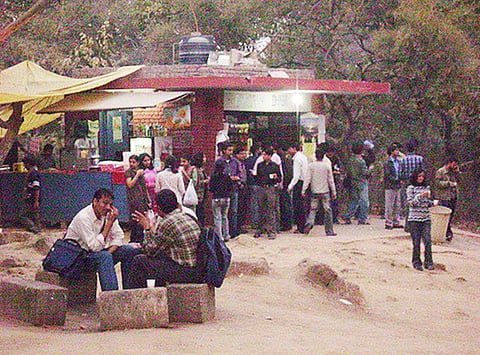

Single tea or Starbucks? In the toss-up between food courts and fancy food, JNU students have somehow always sided with Ganga Dhaba, that tiny 59-year-old brick building surrounded by trees and littered with makeshift benches, as it offered them the sort of comfort, both financially and gastronomically, that a Cafe Coffee Day or a Starbucks could never offer. For Rs 5, they got a cup of tea. Add five bucks more and you get a yummy bread omelette.
Which is why the university administration's decision to shut down the Dhaba has come as a shocker to the students and the alumni. "In response to growing demand from the students for the availability of clean and hygienic food, and also creating good ambience in the campus, the Executive Council has taken a decision to explore the feasibility of food courts at suitable locations in the campus," JNU's administration said in a statement. These food courts are supposed to replace and not co-exist with the Dhaba and other small outlets. Incidentally, there was a previous attempt to do away with the Dhaba, but it was thwarted by the students.
Understandably, the JNU Students' Union is upset. After all, Ganga Dhaba isn't just great because it offers cheap food and is open pretty much all night. It is an integral part of the university's culture. From anthropology to history to politics, they were addas aplenty on the benches outside. Umar Khalid, a Bhagat Singh Ambedkar Students Organisation (BASO) leader in the university reminisces the conversations and the cups of tea he has had at Ganga Dhaba during his time as a student in the university. "I remember throughout my MA, every night I'd come out to Ganga Dhaba and be there for at least an hour. There, my classmates and I would discuss all that we've heard in class. It was difficult to cope in JNU initially, but these group discussions in Ganga Dhaba allowed me to grasp my subjects better," he recalls. The thought of the Dhaba being shut down was a bitter pill to swallow.
The Dhaba is open from 4 PM to 3 AM. Since the campus is very alive during the night with protests and processions, the students would usually miss the mess food and the Dhaba was often the saviour at those times. "Ganga Dhaba is where I had my dinner most of the nights because that will be the only place open then. Even now, whenever I go to JNU, I have my food from here," says Umar.
But the administration's decision comes as no surprise for him. "I was expecting this. Attempts have been made to do away with the dhabas for quite some time now. JNU always followed an inclusive model until now. Now they want to commercialise it. If tomorrow the Dhaba gets replaced by (God forbid), a Cafe Coffee Day, it changes the entire thing together. The prices will go up and people will no longer be able to afford food. Every action by the administration is trying to kill the soul and spirit of JNU," he says.
Like a lot of other things, JNU alumni associate what is happening to the Dhaba with what they feel is wrong with the college. It's been more than three decades since KS Dakshina Murthy graduated from JNU. For him, the latest decision is "a part of the largest diabolical plan to alter the character ofJNU itself and basically make it buckle on its knees." He compares closing down the dhabas to uprooting a tree. "All the dhabas had a certain story or importance. They all served a purpose. Ganga Dhaba was the first in the campus and a lot of outsiders also come there. Shutting it will kill the culture of JNU," he says.
Both Umar and Dakshina Murthy agree on how the decision will also kill the culture of debate and discussion that have kept the university's spirit alive and set it apart from the other colleges. "You leave JNU, but JNU never leaves you. It makes so many things possible for you. You interact with so many diverse people," says Umar who believes that people like him ended up doing a PhD only because of JNU.
This is not the first time that the university's administration has tried to close down the dhabas. Back in August 2016, the admin had asked Bharat Tomar, the owner of Ganga Dhaba to shut down the place. But then, the students resisted and saved the place. "We will resist it even now," says Apeksha Priyadarshini, a student. She says that Sabarmati Dhaba, where events were held previously started shutting down earlier when she was a student. "The dhaba owners are very upset even now. Most of us survive on our scholarship money, and hence most of us find it difficult to afford food courts and cafes," she says.
